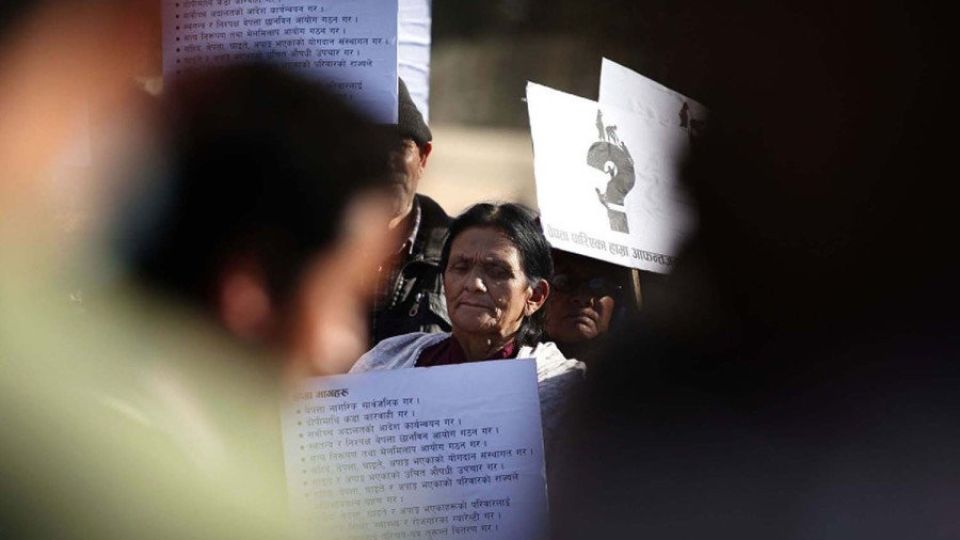December 9, 2024
KATHMANDU – The selection of the potential office bearers for the two transitional justice commissions has landed in controversy, with conflict victims and other stakeholders objecting to the shortlist of candidates for chairpersons.
The recommendation committee, led by former chief justice Om Prakash Mishra, was tasked with selecting chairpersons and members for the commissions. It has shortlisted candidates for 10 positions, including eight for the posts of chairpersons of the Truth and Reconciliation Commision and the Commission of Investigation on Enforced Disappeared Persons.
In a statement on Saturday, 28 organisations representing insurgency-era victims have asked the Mishra-led committee to correct the selection process, which they said is heading in the wrong direction.
“The shortlisted names, especially for the chairpersons’ positions, have been published with the intention of forming a controlled and weak commission, as was done in the past,” reads the statement. “Transitional justice mechanisms are not meant to serve as employment opportunities or political management tools for henchmen [of the political leadership].”
The selection committee has picked Sudip Pathak, a former member of the National Human Rights Commission, Kashi Raj Dahal, former chairperson of the Administrative Court and Sher Bahadur KC, a former president of the Nepal Bar Association, as possible candidates for heading the truth commission.
Similarly, retired high court judges Achyut Prasad Bhandari and Dilli Raj Acharya; Bijay Sijapati, former dean of the Faculty of Law under Tribhuvan University; Bishwo Raj Koirala and Mahesh Thapa, both retired deputy attorneys general, have been shortlisted to head either of the two commissions.
The Mishra-led panel has called for public feedback on the chairperson candidates, alongside 32 candidates for eight member positions—four in each commission. It has allocated three days—December 12 to 14—for them to make presentations before the panel. From the shortlist, the panel will nominate 10 names, including two chairpersons, to the government for appointment.
However, the conflict victims have warned that appointing chairpersons from among the current shortlist will cause the commissions to fail in their tasks, as they have in the past. This is the third time the government is appointing office bearers in the two commissions, as the previous commissions largely failed to carry out their tasks for various reasons.
“While we respect everyone’s dignity and competence, prioritising controversial figures over the best-qualified individuals for this crucial national responsibility undermines both national and international credibility. We feel that the opportunity to conclude transitional justice after long delays is at risk of being wasted. This situation necessitates urgent awareness among all concerned parties to prevent transitional justice from becoming further complicated and manipulated,” reads the joint statement issued by 28 various organisations.
They have also called on the constitutional human rights body, the National Human Rights Commission (NHRC), to ensure checks and balances and refrain from “becoming a mute witness to the politicised and partisan selection process”. Manoj Dawadi, a commissioner in the NHRC, is a member of the Mishra-led recommendation panel.
Human rights defenders have also expressed their reservations about the shortlist. “The appointment of competent office-bearers is a precondition to conclude the long pending task of transitional justice,” said Mohna Ansari, a former human rights commission member. “However, the recommendation committee has failed miserably in fulfilling its responsibility.”
Some of the applicants have even questioned the transparency of the shortlisting process and demanded that the committee make the criteria public.
“The Mishra-led committee had shortlisted me as a member in 2019. What disqualifies me this time, as I have gained more national and international experience since the last time,” questioned Shree Ram Adhikari, a former NHRC officer who also worked with the United Nations. “I demand clarification from the committee.”
Rajendra Senchurey, another applicant for membership of the transitional justice commissions, raised similar questions. “Some seasoned applicants were more qualified than those on the shortlist. This has raised questions about the credibility of the selection process,” he said.
The victims have asked the recommendation committee to revise the shortlist to include qualified but excluded individuals to ensure a competitive selection process.
“Additionally, we call for an end to the blatant manipulation of the selection process, respect its independence and fairness. We urge the top political leadership and responsible parties to put an end to the shameful interference in the selection process,” the statement reads.


